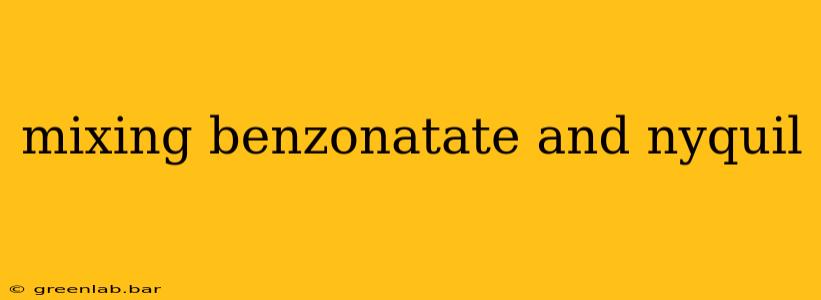Mixing medications can be a dangerous game, and combining Benzonatate with NyQuil is no exception. This article explores the potential consequences of this combination, emphasizing the importance of consulting a healthcare professional before mixing any medications. We'll delve into the individual effects of each drug, their potential interactions, and the crucial steps to take if you're considering using them together or have already done so.
Understanding Benzonatate and NyQuil
Before exploring the risks, let's understand what each medication does:
Benzonatate: This is a non-narcotic cough suppressant that works by numbing the nerve endings in your lungs and airways, reducing the urge to cough. It's often prescribed for coughs associated with the common cold, bronchitis, or other respiratory illnesses. It's crucial to note that Benzonatate is not intended for long-term use.
NyQuil: This is an over-the-counter (OTC) medication used to treat cold and flu symptoms. It typically contains a combination of acetaminophen (or ibuprofen in some formulations), an antihistamine (like diphenhydramine), and a decongestant (like phenylephrine or pseudoephedrine). These ingredients work together to reduce fever, relieve aches and pains, dry up nasal congestion, and induce sleepiness.
The Dangers of Combining Benzonatate and NyQuil
The primary concern with mixing Benzonatate and NyQuil lies in the potential for additive side effects. Both medications can cause drowsiness, and combining them significantly increases the risk of excessive sedation, leading to:
- Increased drowsiness and fatigue: This can impair your judgment, reaction time, and coordination, making it unsafe to drive or operate machinery.
- Dizziness and lightheadedness: This can increase your risk of falls and injuries.
- Respiratory depression: In rare but serious cases, the combined sedative effects can depress your respiratory system, reducing your ability to breathe effectively. This is particularly dangerous for individuals with pre-existing respiratory conditions.
- Adverse drug interactions: While not as common, unforeseen interactions between the specific ingredients in NyQuil and Benzonatate could occur, especially if you have other underlying health conditions or are taking other medications.
What to Do if You've Already Mixed Them
If you've already combined Benzonatate and NyQuil and are experiencing concerning side effects, seek immediate medical attention. Do not hesitate to contact your doctor, a pharmacist, or emergency services. Provide them with a detailed list of all medications you've taken, including dosages.
Alternative Approaches for Cough and Cold Relief
It's always best to consult a healthcare professional for advice on treating coughs and colds. They can help you determine the most appropriate medication based on your individual needs and medical history. They might suggest alternative treatments like:
- Over-the-counter cough suppressants other than Benzonatate: Several other options are available, each with its own set of potential side effects.
- Expectorants: These medications help thin and loosen mucus, making it easier to cough up.
- Home remedies: Rest, hydration, and using a humidifier can also provide relief from cold and flu symptoms.
Disclaimer: This information is for educational purposes only and should not be considered medical advice. Always consult with a healthcare professional before starting any new medication or changing your current medication regimen. This article is not intended to provide a comprehensive list of all possible interactions or side effects.
Author Note: This article was written by a health information specialist with extensive experience in researching and writing about medication safety. The information presented here reflects current medical knowledge and best practices.

